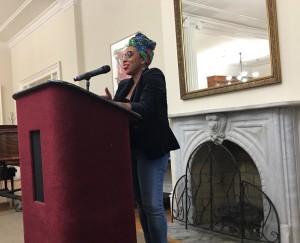Mills’ Contemporary Writers Series brought poet Morgan Parker to Mills on March 5.

According to her website, Parker is the recipient of a 2017 National Endowment for the Arts Literature Fellowship and the winner of a 2016 Pushcart Prize. She attended Columbia University, where she received her Bachelors in Anthropology and Creative Writing, and received her MFA in Poetry from NYU.
Parker’s body of work includes “There Are More Beautiful Things Than Beyoncé,” “Other People’s Comfort Keeps Me Up At Night,” and her recent poetry collection “Magical Negro,” which she read pieces from during the event with an enthusiastic reception from the listeners.
The post-reading Q&A elicited many insightful responses from Parker, who conversationally and transparently engaged with the audience about her opinions on the poetry canon and reflections on her own experiences. The audience was enthralled with Parker’s words, finger snapping in response to many of her answers.
It took Parker until she was twenty to find the flexibility and excitement of poetry through the discovery of other people her age and race writing it. When asked how she would redesign the curriculum for poetry, Parker responded, “The other way. Backwards! You don’t have to read ‘Gilgamesh’ until maybe ever. That’s my thinking. I’m here for some parts of the canon, but I do think it doesn’t make sense to try to force something on folks that they’re not into. And that’s not the end of poetry.”
Parker referenced being in elementary school and high school and recognizing that even the teachers didn’t seem excited about the prospect of studying poetry in class. She recently visited a high school with poet Danez Smith and the students became excited about poetry after Smith and Parker talked to them.
“You get so much more appreciation for say, Shakespeare, when you’ve learned poetry in your own language,” Parker said.
Parker talked about being told that she wasn’t writing “capital-P poetry” and it was only then she felt freedom to compose the way she envisioned, without the pretension around maintaining inaccessibility. She briefly discussed being asked by interviewers if her writing was poetry, to which she answered, “It says [the genre poetry] on the back of the book. If I were a white man I do not think I would be asked that question. Or a white woman, or a Black man.”
When asked who would be in her canon, she cited poets such as Langston Hughes, Lucille Clifton, June Jordan, Frank O’Hara, Anne Sexton, Ishmael Reed and Nikki Giovanni.
“I would have it be more than the two Black poets you read,” she said.
In an interview with NPR, she explained some of the thematic content in “Magical Negro.”
“I wanted to speak about what it feels like to continually turn on the TV and see yourself being killed,” she said. “I really wanted to point at … the kind of way that we carry all of those experiences throughout history.”
Parker’s writing has also appeared in the New York Times, where she wrote an opinion article named “How to Stay Sane While Black.” The piece offers a frank depiction of mental health and historical trauma with her trademark incisive and thoughtful writing.
Parker spoke to the crowd about mental health self-care and not wrecking herself outside of art, mentioning several times throughout the event about staying in a constant state of discomfort.
“That part is important, going to therapy and taking pills and not feeling like I have to muscle through it,” she said. “I’m willing to be … super uncomfortable all of the time if it means that someone else feels a little bit of permission and validation and feels seen. I’ve spent so much of my life feeling not seen and feeling very alone in my emotions and the way I see the world, and something about writing those things honestly is not only freeing but an act of service on my part. I try to see it that way, as an offering, basically.”
